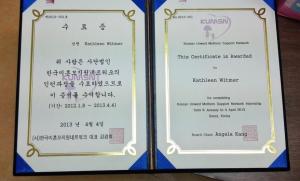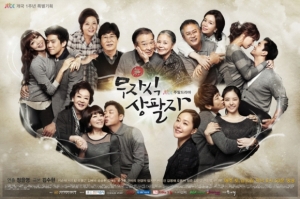What happened?!
For many across the globe, March 21st, 2013, will be remembered as a very important day in child welfare. It was on this day that Australian Prime Minister, Julia Gillard, delivered a National Apology to those impacted by forced adoption practices in Australia, which you can view here:
Australia’s National Apology for forced adoption practices
My first impression:
When I first listened to this speech, I was taken by surprise at how great it was. The speech was well written, very informed, and well-delivered byPM Gillard. She not only made an official apology to members of the adoption triad and others who had been affected (including natural fathers and extended family members) but she also spoke to the systemic and societal environment between the 1950’s and 1970’s which left unmarried mothers feeling as if they had no choice but to give up their children for adoption. Even mothers who intended to keep and raise their child on their own, were often coerced, disempowered, and even bullied into signing the consent form which would free their child for adoption.
According to a report that the Australian government released last year, it was found that many medical personnel, social workers, and adoption agencies used coercion and even administered prescription drugs to unwed mothers as a way of attaining their infants for adoption. These methods were frequently used in maternity facilities in order to obtain more infants and meet the demand of the adoption industry.
This reminded me of what I had learned through journal articles and class discussions about truth and reconciliation as well as national apologies came to mind. I also wondered if the social workers, agencies, organizations, and hospitals that implemented these methods felt the need to apologize since they were the ultimate system which oppressed and exploited these women. After the weekend had passed and I searched the internet news, I was surprised to find that one of the hospitals did issue an apology.
Melb hospital joins PM in adoption apology
While these apologies do not take away from the disenfranchised grief and marginalization that unwed mothers and others in the adoption triad experienced, recognizing the experiences of “victims”, the unethical malpractice of adoption, and as Gillard put it perfectly, the denial of the “fundamental rights and responsibilities to love and care for your children. You were not legally or socially acknowledged as their mothers. And you were yourselves deprived of care and support” by “the bullying arrogance of a society that presumed to know what was best” is one way the Australian government can take responsibility.”
How is the South Korean government and/or public reacting to Australia’s National Apology for forced adoption?
I was not surprised to learn that the news of this historical moment in Australia did not reach headlines in Korea, especially with everything being centered on the increasing tensions between North and South Korea and the recent cyber attack on South Korea. However, I didn’t think it would be almost invisible since South Korea is noted by many as the “#1 baby exporter” and one of the “founding fathers of adoption practice”. If there were to be another national apology for forced adoption practices, I would immediately expect it to be South Korea next (or possibly China).
While searching for more information about the case of Australia, I was not able to find any kind of coverage from a Korean publisher about this issue. Using the keywords “Australia”, “forced adoption”, “South Korea”, “Korean adoption” on a Google search, I was not able to find any news articles related to the issue. In fact, I could not locate any recognition or news story written about the forced adoption apology in Australia on the three Korean news websites published in English: Korea Times, Korea Herald, and Chosun Ilbo. Since I have a barrier with Korean language, it is possible that I am wrong about it being “missing” from Korean discussion. If this is the case, please let know if and where there is any information about Australia’s National Apology in the Korean news (written in English or Korean) or discussion, please let me know since I’d be interested to hear the opinions and views of Koreans on the recent event.
On the other hand, Australia’s National Apology has had an international impact and seems to have started a movement as other countries are beginning to question their own adoption practice and policies in their own countries: New Zealand, Canada, Scotland, and most recently, Great Britain and Ireland. I found it very interesting, but not surprising, that adoption practices and child welfare programs across the globe are in speculation. I think I can make an educated guess that the use of coercion and force, the lack of economic and government support, and the societal stigma and values surrounding unwed or single mothers is not specific to Australia (i.e. similar experiences and historical context of women, children, and families in the U.S.)
Calls for probe into forced adoptions (Ireland)
Irish Women emerge from shadows of ‘National Shame’ (Ireland)
Ireland’s Magdalene Laundries: I hope my birth mother can now rest in peace (Ireland)
Australia’s scandal of forced adoption is happening here in Britain (Great Britain)
Origins Canada
Origins Scotland
I believe that organizations in Korea such as KUMSN, unwed mothers, and other organization’s or women’s groups should look to Australia as an example of the power that collective social movements can have. I also think it is also important to increase public access to these types of stories and help them to make the connection between what has happened in Australia and what is still a common practice in the maternity homes and hospitals in Korea. Since the majority of the population is not getting the information from the news media and may not be aware there is an issue, it is the responsibility of NGO’s, volunteers, and anyone else who feel strongly about the issue and social justice for unwed mothers and women in Korea, should assume this responsibility.
Forced adoption practice and the role of social workers
In the U.S., many people do not fully understand or are unable to explain what social workers do or who they are because social workers work in a variety of environments and in a variety of roles. However, a common perception of the social worker’s role is the ‘family divider’ or ‘child remover’. This is most likely because of the establishment of Child Protective Services and the role of social workers in America’s child welfare history. As the privacy of the family and home became a public issue and the issue of child maltreatment and domestic violence was revealed, CPS workers (called social workers) removed children from their families and home for their protection. While the focus has shifted to the preservation of families with programs such as kinship care and the increase in parental rights, some still have negative views of social workers.
The exposure of unethical and malpractice in adoption by social workers, medical professionals, religious groups and non-profit or charitable organizations in Australia will most likely perpetuate these views and the perception that social workers are “breaking families apart”. In reality, it IS what social workers did and it IS what happened. While I’d like to believe that most of those involved in practice at that time were well-intentioned and following the practice standards of the time, social workers from that time and afterward should take responsibility. It wouldn’t be the first time that the social work field has evaluated past practice as being poor or malpractice, but it is more important that future social workers learn from past practice and work towards improving the standard of practice. It is also important for social workers to advocate and seek social justice for the populations we serve to prevent systemic marginalization and oppression as exemplified by the recent events in Australia.
More resources:
Australia PM Gillard sorry for ‘shameful’ forced adoptions




